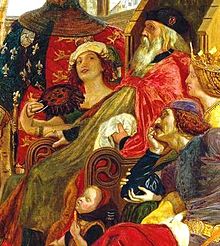Alice Perrers
| Alice Perrers | |
|---|---|

Perrers seated beside King Edward III, as imagined by Ford Madox Brown
|
|
| Born | 1348 Hertfordshire, England |
| Died | 1400 (aged 52) Gaynes Park, Upminster, England |
| Resting place | Church of St Laurence, Upminster, England |
| Nationality | English |
| Occupation |
Lady-in-waiting to Queen Philippa of Hainault Mistress of King Edward III of England Landowner |
Alice Perrers (1348–1400) was a fourteenth-century English royal mistress whose lover and patron was King Edward III of England. She met him originally in her capacity as a lady-in-waiting to Edward's consort, Philippa of Hainault. She went on to become the wealthiest woman in the land. However, she was despised by many and was accused of taking advantage of the far older king with her youth, beauty, and opportunistic character.
Perrers was born in 1348 (exact date unknown) to Sir Richard Perrers, a prominent Hertfordshire landowner who had been sheriff of Hertfordshire and Essex from 1315 to 1319, and again in 1327, 1329, and 1330. He had also been a Member of Parliament for his county in the 1330s. The Hertfordshire family of Perrers had a long-standing quarrel with the abbey of St Albans, which had caused him to be imprisoned in 1350 and even outlawed in 1359. This, and the fact Alice herself became involved in the dispute, could go some way to explain Alice’s dreadful reputation; the majority of what we know of Alice comes from the blatantly hostile St Albans Chronicle.
The Chronicler, Thomas Walsingham, claimed Alice was the illegitimate daughter of an Essex tiler and a tavern whore, suggesting she only enchanted Edward through sorcery and magic: a common explanation in the Middle Ages for beautiful women who captured the heart of kings. She was described as "extremely ugly" and ruling the king through flattery, a seductive voice and supernatural powers explaining accusations of witchcraft on her behalf. However, Charles Lethbridge Kingsford states that she most probably was the daughter of Sir Richard Perrers, and enticed the King with her clever tongue. However he dismisses the claims she was "extremely ugly" as the King was certainly known to like clever and attractive women, attributes Alice had in abundance.
In 1362 Alice arrived at court and served as a lady-in-waiting to Philippa of Hainault, the respected and matronly queen of Edward III. Alice's beauty and charm caught the eye of King Edward while at court. Shortly after, around 1363, when she was only 15 years of age (the king was 52), she became the mistress of Edward III. This was only 6 years prior to the queen's death in 1369 of dropsy. Until the queen's death, their relationship was extremely secret and veiled. Only when Philippa died in 1369 did Alice's affair with the king become more conspicuous, and it aroused bitter envy and hatred at court especially as Alice was only 21 years old. Following the queen's death, a devastated Edward leaned heavily on her considerable abilities; her courtly dominance accelerated by his loss. Alice acquired numerous gifts from the King and she soon became an extremely wealthy lady. Her lover bestowed upon her property and even jewels belonging to the late queen. Manipulating the mourning and bedridden King to her will, Alice dipped her hands into the royal treasury and amassed a fortune worth more than £20,000 (£6,000,000 in 2016) between the embezzled money, vast properties and royal jewels in her possession. Dressed in golden garments, Perrers was paraded around London as "The Lady of the Sun" on the king's command, and courtiers were expected to behave respectfully towards her. This caused a great wave of criticism from the public and Edward's Court. By the early 1370s, it was clear that Alice possessed political ambitions alongside her craving for a vast fortune. Alice dominated the King's Court and enjoyed almost total control of royal patronage. She used her position to advance her circle of friends into high positions, and she became the ailing King's principal adviser on all matters relating to the country. From 1370-1376, Alice can be said to have ruled the country indirectly through Edward III, an unheard-of feat for a female of no royal descent in her early to mid-twenties. Alice's power and eminence soon became legendary, and it was reported that she instilled fear into the populace, amongst whom no-one dared to prosecute a claim against her. Alice was seen as an ambitious, grasping, calculating and cold-hearted opportunist who manipulated the ailing King into granting her unheard-of wealth and status, at a court that brimmed with spite and loathing of her. Towards the end of Edward's reign, Alice was accused of making his life a misery and of luring him with her charms only to further her own personal ambitions.
...
Wikipedia
